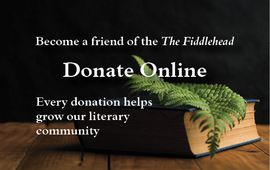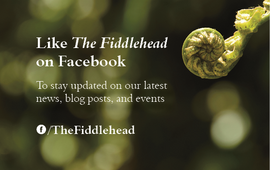
One recent June evening I attended a mesmerizing concert at the home of artist Stephen May, the first “house concert” I’d ever attended. Six other guests came, so with the host and four musicians, we were a gathering of twelve. The intimate group was surrounded by seven glorious May paintings and one pitiful palm tree. The musicians were plainly dressed: no theatrical tricks or garish makeup.
The two duos gave me a music experience the like of which I’d never had. Each duo played one half-hour piece, not stopping or even pausing. I’ve heard similar music before, often on the late night CBC program of atonal “new music” years ago. What was fresh to my experience was seeing the musicians wrestle with their instruments, understanding how such improvised avant garde jazz is produced. I could get tangled up in the emotion of it.
The two Fredericton musicians began the evening — guitarist Joel LeBlanc and trumpeter Nicole Rampersaud. Their music conveyed two lost souls crying out in the wilderness. They each tortured their instruments. LeBlanc twisted and scraped the strings of the guitar; at one point he looked as if he were going to wring its neck. His eyes were closed, his mouth grimacing, his head flailing — interpreting hell on earth. Rampersaud attacked the trumpet with ferocity, blowing into it in every conceivable way, sometimes even without the mouthpiece, assaulting its valves. She grotesquely screwed up her mouth, eyes closed, beating the instrument into submission. The two did not look at each other, acknowledge each other’s presence.
The music that resulted was an illumination of what each instrument could be made to do, what sounds could be forced out of them. After their set was over, Stephen asked if they had a score. No, LeBlanc said, they didn’t this night but sometimes they did. Rampersaud is a composer as well as a musician, and she often plays from a score. LeBlanc said there were frequently echoes of George Gershwin, and in the piece they just played there were some of these references. Had we heard them? I confess that I hadn’t. Was he joking?
If Rampersaud and LeBlanc were two lost souls crying in the night, Jennifer Thiessen and Ida Toninato were two lost souls seeking each other, yearning for each other. Thiessen plays the viola d’amore, a baroque instrument she also uses in early music ensembles. She told us how it works, how it’s different from the usual viola. Under the main strings lie a second set, sympathetic strings that pulsate to the main. She bowed and plucked in the usual ways but still made strange sounds come out.
Toninato plays a baritone saxophone almost as tall as she is, splendid with its glittering array of brass tubes and buttons. Her attack was passionate but loving. A little way into the set she unhooked the sax and keened for a few minutes in almost the same low register as the instrument. Later she again unhooked it and keened for a longer period. She uncannily was able to mimic the throaty sound of the sax. I longed to join in, to become part of her spellbinding. I played the baritone horn in the high school band; my lousy voice is also low and nasal, so the register is familiar.
The two women were in tune with each other. Their playing was not the “call-and-response” of some musical duos; it was more calling and hoping for a response.
I read on their website that they performed last year at the Sound Symposium in St. John’s, Newfoundland, an event high on my bucket list.
About twenty years ago my husband Bill and I hosted Claire Coulter performing a monologue, The Fever, written for her by Wallace Shawn. She sat enveloped in our big leather chair, in ordinary clothes and makeup, and talked to ten of our friends for an hour. That intimacy, in an ordinary home, elicited a reaction different from that elicited at a stage performance.
I also was reminded of an arts evening that Lucia Lauzon and I arranged at the then newly-formed Gallery Connexion. For the music part of the event Lauzon brought many instruments of the kind that non-musicians could use: penny whistles, thumb pianos, bongo drums, recorders. We also keened. As night descended and darkness prevailed in that basement room, Lucia led us through a half hour of making strange music.
A knowledgeable friend who knew about the house concert but wasn’t in attendance was surprised that I enjoyed the evening: “I should have warned you.” Some people might say, “That’s not music; that’s caterwauling.” But I know from the experience of 85 years that I must allow myself to fall into whatever form of art is out there, no matter how bizarre. Sometimes I can’t, but happily on this evening I could. Seeing how the musicians interacted, how they compelled the instruments to make these sounds, exploring what music is, what sound does, and appreciating what the improvising imagination can produce along with eleven other people who reacted as one entity, one consciousness¬ is a privilege for which I’m grateful. A sacred vitality.











Comments
Nancy Bauer's article
This column
Add new comment